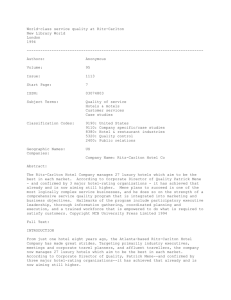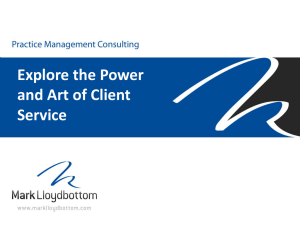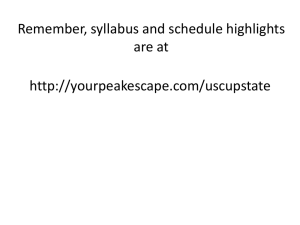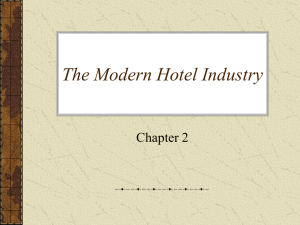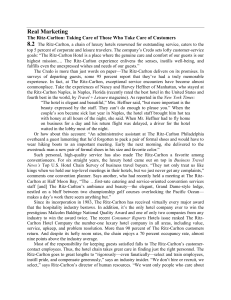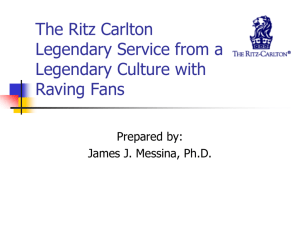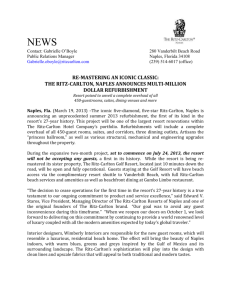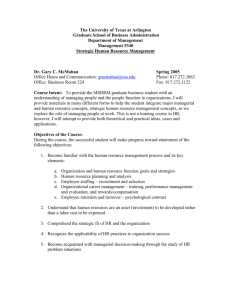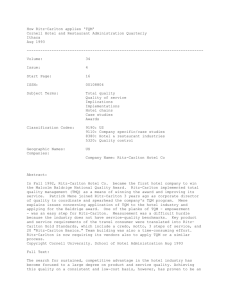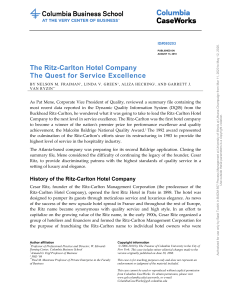The Ritz-Carlton Hotel Co
advertisement
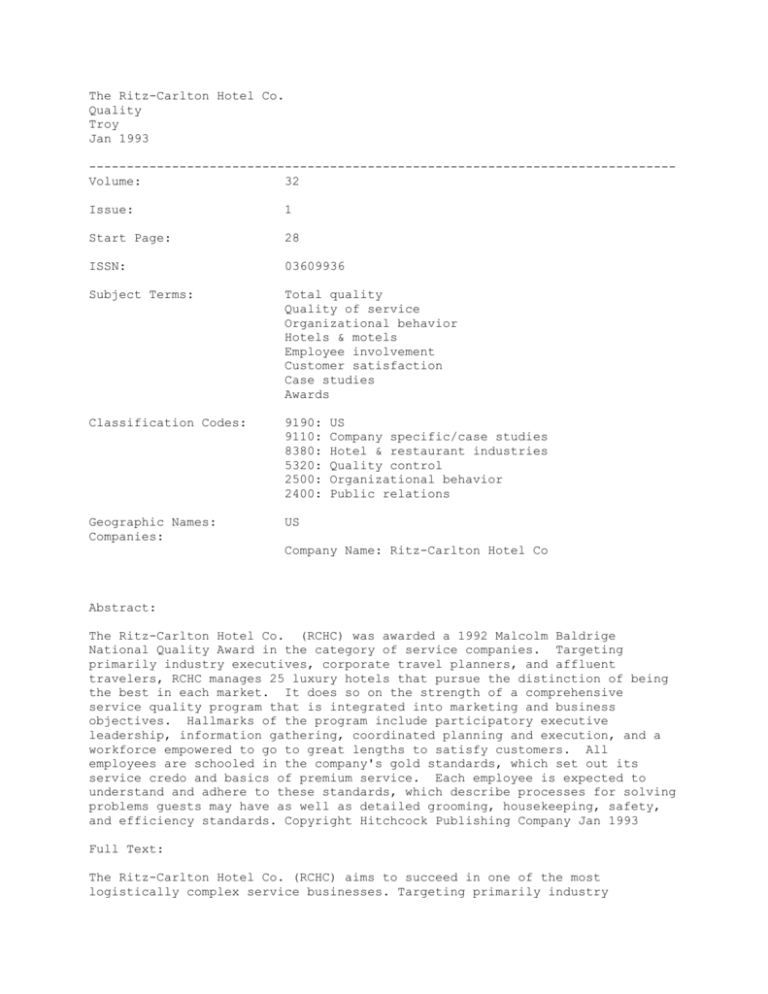
The Ritz-Carlton Hotel Co. Quality Troy Jan 1993 -----------------------------------------------------------------------------Volume: 32 Issue: 1 Start Page: 28 ISSN: 03609936 Subject Terms: Total quality Quality of service Organizational behavior Hotels & motels Employee involvement Customer satisfaction Case studies Awards Classification Codes: 9190: 9110: 8380: 5320: 2500: 2400: Geographic Names: Companies: US US Company specific/case studies Hotel & restaurant industries Quality control Organizational behavior Public relations Company Name: Ritz-Carlton Hotel Co Abstract: The Ritz-Carlton Hotel Co. (RCHC) was awarded a 1992 Malcolm Baldrige National Quality Award in the category of service companies. Targeting primarily industry executives, corporate travel planners, and affluent travelers, RCHC manages 25 luxury hotels that pursue the distinction of being the best in each market. It does so on the strength of a comprehensive service quality program that is integrated into marketing and business objectives. Hallmarks of the program include participatory executive leadership, information gathering, coordinated planning and execution, and a workforce empowered to go to great lengths to satisfy customers. All employees are schooled in the company's gold standards, which set out its service credo and basics of premium service. Each employee is expected to understand and adhere to these standards, which describe processes for solving problems guests may have as well as detailed grooming, housekeeping, safety, and efficiency standards. Copyright Hitchcock Publishing Company Jan 1993 Full Text: The Ritz-Carlton Hotel Co. (RCHC) aims to succeed in one of the most logistically complex service businesses. Targeting primarily industry executives, meeting and corporate travel planners, and affluent travelers, the Atlanta-based company manages 25 luxury hotels that pursue the distinction of being the best in each market. It does so on the strength of a comprehensive service quality program that is integrated into marketing and business objectives. Hallmarks of the program include participatory executive leadership, information gathering, coordinated planning and execution, and a trained workforce empowered "to move heaven and earth" to satisfy customers. Of these, committed employees rank as the most essential element. All are schooled in the company's "gold standards," which set out RCHC's service credo and basics of premium service. RCHC is a management company that develops and operates luxury hotels for W.B. Johnson Properties, also in Atlanta. In 1983, W.B. Johnson acquired exclusive US rights to the Ritz-Carlton trademark, a name associated with luxury hotels for 100 years. RCHC operates 23 business and resort hotels in the US and two hotels in Australia, has nine international sales offices, and employs 11,500 people. Two subsidiary products, restaurants and banquets, are marketed heavily to local residents. Quality planning begins with president and CEO Horst Schulze and 13 senior executives who make up the corporate steering committee. This group, which doubles as the senior quality management team, meets weekly to review the quality of products and services, guest satisfaction, market growth and development, organizational indicators, profits, and competitive status. Each year, executives devote a fourth of their time to quality-related matters. The company's business plan demonstrates the value it places on goals for quality products and services. These goals draw heavily on consumer requirements derived from extensive research by the travel industry and the company's customer reaction data, focus groups, and surveys. The plan relies on a management system designed to avoid the service variability traditionally associated with hotels. Uniform processes are well-defined and documented at all levels. KEY BASICS Key product and service requirements of the travel consumer have been translated into the gold standards, which include a credo, motto, three steps of service, and 20 "Ritz-Carlton basics." Each employee is expected to understand and adhere to these standards, which describe processes for solving problems guests may have as well as detailed grooming, housekeeping, and safety and efficiency standards. Company studies prove that this emphasis is on the mark, paying dividends to customers and, ultimately, to Ritz-Carlton. The corporate motto is "ladies and gentlemen serving ladies and gentlemen." To provide superior service, Ritz-Carlton trains employees with a thorough orientation, followed by on-the-job training, then job certification. RitzCarlton values are reinforced continuously by daily "line ups," frequent recognition for extraordinary achievement, and a performance appraisal based on expectations explained during the orientation, training, and certification processes. To ensure problems are resolved quickly, workers are required to act at first notice regardless of the type of problem or customer complaint. All employees are empowered to do whatever it takes to provide "instant pacification." No matter what their normal duties are, other employees must help when asked by a fellow worker who is responding to a guest's complaint or wish. Much of the responsibility for ensuring high-quality guest services and accommodations rests with employees. Surveyed annually to ascertain their levels of satisfaction and understanding of quality standards, workers are aware that excellence in guest services is a top hotel and personal priority. A full 96 percent of all employees surveyed in 1991 singled out this priority, even though the company had added 3,000 new employees in the preceding three years. At each level of the company, teams are charged with setting objectives and devising action plans that are reviewed by the corporate steering committee. In addition, each hotel has a quality leader who serves as a resource and advocate as teams and workers develop and implement their quality plans. Teams and other mechanisms cultivate employee commitment. For example, each work area is covered by three teams responsible for setting quality-certification standards for each position, problem solving, and strategic planning. The benefits of detailed planning and the hands-on involvement of executives are evident during the seven days leading up to the opening of a new hotel. Rather than opening it in phases (the industry practice), Ritz-Carlton aims to have everything right when the door opens to the first customer. A seven-day countdown control plan synchronizes all steps leading to the opening. The company president and other senior leaders personally instruct new employees on the gold standards and quality management during a two-day orientation. A specially selected start-up team comprising staff from other hotels around the country ensures all work areas, processes, and equipment are ready. Daily quality production reports, derived from data submitted from each of the 720 work areas in the hotel system, serve as an early warning for identifying problems that can impede progress toward meeting quality and customersatisfaction goals. Coupled with quarterly summaries of guest and meeting planner reactions, the combined data are compared with predetermined customer expectations to improve services. Among the data gathered and tracked overtime are guest room preventive maintenance cycles per year, percentage of check-ins with no queuing, time spent to achieve industry-best clean room appearance, and time to service an occupied guest room. From automated building and safety systems to computerized reseation systems, Ritz-Carlton uses advanced technology to full advantage. For example, each employee is trained to note guest likes and dislikes. These data are entered in a computerized guest history profile that provides information on the preferences of 240,000 repeat RCHC guests, resulting in more personalized service. The aim of these and other customer-focused measures is not simply to meet the expectations of guests but to provide them with a "memorable visit." According to surveys conducted for RCHC by an independent research firm, 92 to 97 percent of the company's guests leave with that impression. Reproduced with permission of the copyright owner. Further reproduction or distribution is prohibited without permission.

